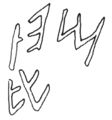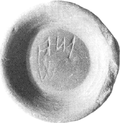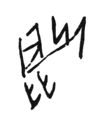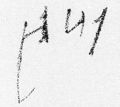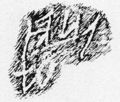CO·14: Difference between revisions
No edit summary |
|||
| Line 28: | Line 28: | ||
Images in {{bib|Garovaglio 1883}}: fig. 1 (drawing = {{bib|Tibiletti Bruno 1969b}}: 285, tav. XIII.28a), {{bib|Rhŷs 1914}}: pl. II (photo), {{bib|Tibiletti Bruno 1969b}}: 285, tav. XIII.28b (tracing), {{bib|Solinas 1995}}: 354 (drawing), {{bib|Morandi 1999}}: 179 (drawing = {{bib|Morandi 2004}}: 628, fig. 20.161) and 202, tav. XV.1 (photo = {{bib|Morandi 2004}}: 800, tav. XXIII.161). | Images in {{bib|Garovaglio 1883}}: fig. 1 (drawing = {{bib|Tibiletti Bruno 1969b}}: 285, tav. XIII.28a), {{bib|Rhŷs 1914}}: pl. II (photo), {{bib|Tibiletti Bruno 1969b}}: 285, tav. XIII.28b (tracing), {{bib|Solinas 1995}}: 354 (drawing), {{bib|Morandi 1999}}: 179 (drawing = {{bib|Morandi 2004}}: 628, fig. 20.161) and 202, tav. XV.1 (photo = {{bib|Morandi 2004}}: 800, tav. XXIII.161). | ||
Two groups/lines of letters inscribed on the foot of the vessel. Seen in the museum by {{bib|Rhŷs 1913}}: 39, III. | Two groups/lines of letters inscribed on the foot of the vessel. Seen in the museum by {{bib|Rhŷs 1913}}: 39, III.1.2, who read two words written sinistroverse in false boustrophedon ''piuai | aa'' 'Aa for Biua' (also {{bib|Rhŷs 1913}}: 8 f.). Whatmough {{bib|PID}}: 102, no. 296 ''p·nại | aḷ'', yet again with a "certain" surprise punct, and notes that the last two letters in line 1 are "apparently conjoint"; new reading by Conway in 1930 ''pnei | aa'' or ''vv'' (p. 630). {{bib|Tibiletti Bruno 1969b}}: 207 f., no. 28 reads ''mẹḳị | ṿạ'' or ''mạḳị | ṿạ'', taken as one word (also {{bib|Tibiletti Bruno 1978}}: 147), observing that the "conjoint" letters in line 1 (read as a ligature) are reminiscent of dubious ''ki'' in [[CO·13]]. {{bib|Morandi 1999}}: 179 f., no. 27 also reads one word, but without ligature {{w||meiva}} (also {{bib|Morandi 2004}}), despite noting that the two letters in line 2 are identical (cf. {{bib|Solinas 1995}}: 354, no. 87 ''ṃẹịạạ''). | ||
Dated to the 4<sup>th</sup> c. BC because of upright alpha by {{bib|Morandi 1999}}: 179, which is hardly reliable considering the doubtful reading. | Dated to the 4<sup>th</sup> c. BC because of upright alpha by {{bib|Morandi 1999}}: 179, which is hardly reliable considering the doubtful reading. | ||
{{bibliography}} | {{bibliography}} | ||
Revision as of 19:46, 8 December 2024
| Inscription | |
|---|---|
| Reading in transliteration: | mei / va |
| Reading in original script: | |
|
| |
| Object: | CO·14 Rondineto (unidentifiable) |
| Position: | foot, outside |
| Direction of writing: | sinistroverse |
| Script: | North Italic script (Lepontic alphabet) |
| Letter height: | 1 cm0.394 in <br /> |
| Number of letters: | 5 |
| Number of lines: | 2 |
| Workmanship: | scratched after firing |
| Condition: | complete |
|
| |
| Archaeological culture: | Golasecca III A [from object] |
| Date of inscription: | 5th–early 4th c. BC [from object] |
|
| |
| Type: | unknown |
| Language: | perhaps Celtic |
| Meaning: | unknown |
|
| |
| Alternative sigla: | Whatmough 1933 (PID): 296 Solinas 1995: 87 Morandi 2004: 161 |
|
| |
| Sources: | Morandi 2004: 629 f. |
Images
Commentary
Images in Garovaglio 1883: fig. 1 (drawing = Tibiletti Bruno 1969b: 285, tav. XIII.28a), Rhŷs 1914: pl. II (photo), Tibiletti Bruno 1969b: 285, tav. XIII.28b (tracing), Solinas 1995: 354 (drawing), Morandi 1999: 179 (drawing = Morandi 2004: 628, fig. 20.161) and 202, tav. XV.1 (photo = Morandi 2004: 800, tav. XXIII.161).
Two groups/lines of letters inscribed on the foot of the vessel. Seen in the museum by Rhŷs 1913: 39, III.1.2, who read two words written sinistroverse in false boustrophedon piuai | aa 'Aa for Biua' (also Rhŷs 1913: 8 f.). Whatmough PID: 102, no. 296 p·nại | aḷ, yet again with a "certain" surprise punct, and notes that the last two letters in line 1 are "apparently conjoint"; new reading by Conway in 1930 pnei | aa or vv (p. 630). Tibiletti Bruno 1969b: 207 f., no. 28 reads mẹḳị | ṿạ or mạḳị | ṿạ, taken as one word (also Tibiletti Bruno 1978: 147), observing that the "conjoint" letters in line 1 (read as a ligature) are reminiscent of dubious ki in CO·13. Morandi 1999: 179 f., no. 27 also reads one word, but without ligature meiva (also Morandi 2004), despite noting that the two letters in line 2 are identical (cf. Solinas 1995: 354, no. 87 ṃẹịạạ).
Dated to the 4th c. BC because of upright alpha by Morandi 1999: 179, which is hardly reliable considering the doubtful reading.
